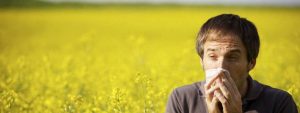Do you suffer with dry eyes that worsen in the spring?
If you also suffer from seasonal allergies, your dry eye symptoms may worsen in the springtime, when blossoming flowers and heavy tree pollen are more than likely to make you sneeze.
A longitudinal research study was conducted in the United States to determine the correlation between seasonal allergies and dry eye syndrome. Over five years, 3.4 million patients visited a Veterans Affairs eye clinic around the U.S, and of the 3.4 million visits, around 607,000 patients were diagnosed with dry eye.
Dry eye and spring
After looking at the monthly prevalence of dry eye syndrome, the results of the study concluded that:
- In the spring, when the pollen count is its peak, 21% of patients were diagnosed with DES.
- Dry eye prevalence was at its lowest in the summer months when only 15% of patients were diagnosed with DES.
Dry eye in the spring is typically caused by exposure to specific allergens, such as:
- Pollen
- Mold
- Dust
- Pet dander
Moreover, both indoor fans and outdoor winds can cause your tears to evaporate more rapidly. When your eyes do not produce enough tears to maintain moisture, dry eyes can occur— causing irritation, itchiness and even the sensation that something is stuck in your eye.
Symptoms of seasonal dry eyes
The most common symptoms of dry eyes in the spring include:
- Redness
- Soreness
- Burning or stinging
- Itchiness
- Blurry vision
- Gritty feeling
- Watery eyes
- Foreign body sensation
Caution: Although your eyes may feel itchy and uncomfortable, try to avoid rubbing your eyes, as it can worsen your symptoms and even damage your cornea— which can result in further complications.
If you experience dry eye symptoms, schedule an appointment with an eye doctor for a proper diagnosis and effective treatment plan.
SEE RELATED: How to Prevent Eye Allergies
5 tips to help manage dry eyes this spring
1. Use a humidifier
Humidifiers help to add moisture and reduce dry air in the environment. A humidifier can be perched on your desk at work or be placed in the corner of the room you frequent the most.
Using a humidifier while you sleep can provide a wealth of benefits to your eyes, while relieving seasonal allergy congestion at the same time. With a humidifier, you will enjoy a more restful sleep and reduce your dry eye symptoms in the morning.
2. Avoid allergens
Limiting exposure to the allergens you are sensitive to can significantly reduce your dry eye symptoms. If you are sensitive to tree pollen, try to remain indoors when the pollen count is high outside.
Wearing wraparound sunglasses when venturing outdoors during allergy season can also significantly decrease your exposure to outdoor allergens and improve your dry eye symptoms as well.
3. Try daily or scleral contacts lenses
Soft contact lenses sit directly on the cornea and can further irritate dry eyes. If contact lenses are worn when the eyes are severely dry, they can even cause corneal abrasions (scratches) or other corneal damage.
Moreover, biweekly and monthly contact lenses can accumulate airborne allergens if not properly disinfected each night.
Most eye doctors recommend refraining from contact lens wear during peak allergy seasons and dry eye flare ups. However, if you prefer to wear contact lenses over glasses, ask your eye doctor about switching to daily disposable contact lenses.
Daily disposables are discarded every night and replaced with a fresh pair of contact lenses in the morning— eliminating allergen accumulation and reducing eye allergies.
If you suffer from chronic dry eyes, scleral contact lenses may be another option for you. Scleral lenses fit differently than soft contact lenses. These rigid contact lenses arch over the cornea and rest on the sclera (the white part of the eye). A liquid reservoir created between the lens and cornea provides continuous moisture and protection, increasing comfort for chronic dry eye sufferers.
4. Use over-the-counter (OTC) eye drops
Over-the-counter (OTC) eye drops called artificial tears or lubricating eye drops are formulated to relieve dry eye symptoms. These eye drops can be used as needed, throughout the day, to provide instant relief for dry, sore, itchy eyes.
Over the counter lubricating gels and ointments are designed for longer lasting relief— gel eye drops can be used through the day, though ointments are generally recommended for nighttime use only, as they can cause temporary blurred vision.
5. Visit your eye doctor
If home remedies and OTC eye drops, gels or ointments are not able to provide the relief you need, schedule an appointment with your eye doctor.
For severe eye allergies and dry eye symptoms, your eye doctor may prescribe medicated eye drops or an oral medication to alleviate your symptoms.
Treatments for severe dry eyes caused by seasonal allergies may include:
- Antihistamines. Antihistamines reduce allergic reactions by blocking the chemical in your body called histamine which causes the allergic response. They are available in eye drops or oral medications.
- Decongestants. Decongestants reduce nasal congestion due to seasonal allergies, as well as red eyes caused by swollen blood vessels in the sclera. Decongestants may be prescribed as an oral medication or nasal spray.
- Mast cell stabilizers. These medications prevent the release of mast cell mediators, such as histamine, to inhibit allergic reactions. These medications are generally prescribed prophylactically prior to the start of the allergy season, as it can take several weeks for the medication to take effect.
- Non-steroidal anti-inflammatory (NSAID) eye drops. These medicated eye drops may be prescribed to reduce eye pain and swelling, as well as other uncomfortable dry eye symptoms.
- Steroids. Corticosteroid eye drops may be prescribed to relieve acute eye allergy symptoms, such as redness and swelling. However, be sure to follow your eye doctor’s instructions if you are using a steroid eye drop, as potential long term side effects do exist.
Schedule an appointment with your eye doctor if your symptoms persist or worsen long after allergy season is over. This may indicate a more serious eye condition that requires a different type of treatment plan.
Seasonal allergies can be quite uncomfortable and lead to dry, sore eyes.
LEARN MORE: Guide to Eye Conditions
If your dry eye symptoms significantly impact your performance of daily activities, visit an eye doctor near you for an eye exam.
Your eye doctor may recommend in-office dry eye treatments to relieve severe dry eyes and discuss other effective ways to reduce your allergy symptoms.
While spring is in the air, don’t get stuck sitting indoors! Treat your eye allergies and dry eye symptoms today!


